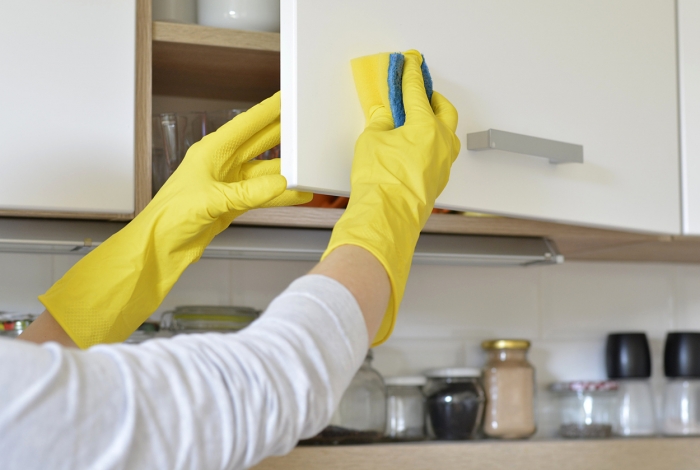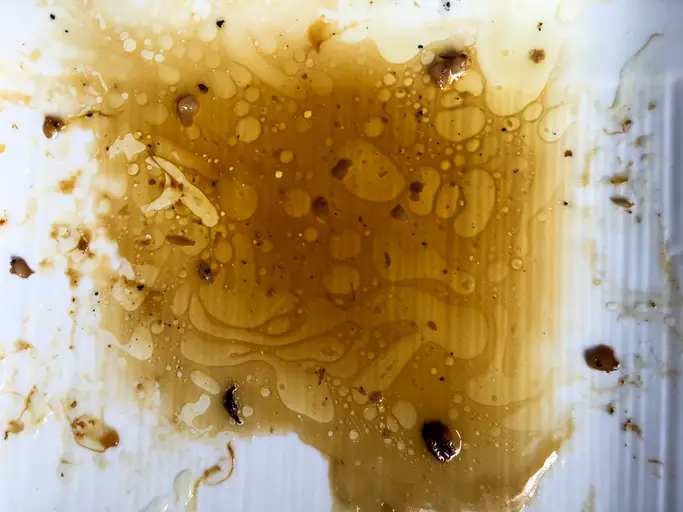Preventing grease build-up in your kitchen requires a bit of elbow grease on your part. But, it’s worth it to keep your space clean and prevent any potential fires. Here are some tips:
1. Wipe up spills immediately – This will help to prevent any big messes and make cleanup much easier.
2. Use hot soapy water – When washing dishes, make sure to use hot soapy water. This will break down the grease better than cold water.
3. Avoid using lots of oil – When cooking, try to avoid using too much oil. This will help to keep the amount of grease down.
4. Clean regularly – Make sure to clean your stovetop, oven, and other surfaces regularly.
A good cleaning once a week should do the trick!
- Wipe up grease spills as soon as they happen
- Clean your stovetop regularly with soap and water
- Use a stovetop cover to help prevent grease buildup
- Keep your exhaust fan on while cooking to help ventilate the area and prevent grease buildup
How to Clean Stove | Over a Decade of Grease Build Up Gone! 💥 No Scrubbing!
How Do You Prevent Grease Build Up in Kitchen Walls?
If you have a build-up of grease on your kitchen walls, there are a few ways to prevent it. First, make sure to clean your walls regularly with a mild soap and water solution. You can also use a vinegar and water solution to help cut through the grease.
Another way to prevent grease build-up is to use cooking spray or oil before cooking. This will help create a barrier between the food and the wall. Finally, make sure to ventilate your kitchen properly to allow any smoke and fumes to escape.
Why is Everything in My Kitchen Covered in Grease?
If you find that your kitchen surfaces are constantly covered in a layer of grease, there are a few possible explanations. First, if you cook frequently or do a lot of deep frying, the grease can build up over time. Second, if you don’t clean your stove top regularly, the grease and oil can accumulate.
Third, if you have an exhaust fan over your stove top, it may not be venting properly and as a result grease and smoke are being redistributed around the kitchen. Lastly, it could be that your home’s ventilation system is not adequately removing cooking fumes from the air. If you suspect this is the case, talk to a professional about ways to improve your home’s ventilation.
Why Do Kitchen Cabinets Get Greasy?
If you’ve ever wondered why your kitchen cabinets get greasy, even after you’ve cleaned them, you’re not alone. It’s a common problem that can be frustrating to deal with. There are a few different reasons why this might happen, and understanding the cause can help you find a solution.
One reason your cabinets might be getting greasy is because of what’s called “splash back.” This happens when water or other liquids from cooking splatter onto the cabinets and leave behind grease and grime. Even if you clean up the mess right away, some of the grease will inevitably remain behind.
Splash back is especially common if your stovetop is located near the cabinets, or if you do a lot of frying or sauteing in your kitchen.Another possible reason for greasy cabinets is that they’re simply not being cleaned often enough. If you don’t regularly wipe down your cabinets (with soap and water or a mild cleaner), dirt and grease can build up over time.
This is especially true if you have light-colored cabinets; dirt and grease will be more visible on lighter surfaces than on dark ones.Finally, it’s also possible that the type of cleaner you’re using isn’t effective at removing grease. If your usual method isn’t working as well as it used to, it might be time to switch to something else.
There are plenty of degreasers on the market specifically designed for cleaning kitchen cabinets; these products can usually cut through even stubborn Grease stains quickly and easily.If your kitchen cabinets are looking extra greasy lately, don’t despair!
How Do You Prevent Grease Build Up in Kitchen Pipes?
Preventing grease build-up in kitchen pipes is important for both the function of your plumbing and the cleanliness of your home. Grease can harden and stick to the inside of your pipes, gradually narrowing the diameter of the pipe and eventually causing blockages. Even small amounts of grease can cause big problems over time, so it’s important to be proactive about preventing grease buildup.
One way to prevent grease build-up in your kitchen pipes is to scrape off any food or grease from pots, pans, plates and utensils before washing them. This will help reduce the amount of grease that goes down the drain and into your pipes. You can also try using a sink strainer or garbage disposal strainer to catch food particles and keep them from going down the drain.
In addition to scraping pots, pans and plates, you should also wipe down your countertops after cooking to remove any greasy residue. It’s also a good idea to run hot water down the drain for a minute or two after washing dishes, as this can help break up any residual grease clinging to the sides of your pipes. If you have a garbage disposal, running it regularly will also help preventgrease buildup in your kitchen pipes.
If you already have some grease buildup in your kitchen pipes, there are a few things you can do to clear it out. First, try pouring boiling water down the drain – this can help melt away any hardened grease that’s stuck to the sides of your pipes. If that doesn’t work, you can try using a plunger or an auger (a plumber’s snake)to clear out any blockages caused by grease buildup.

Credit: www.ovenclean.com
How to Prevent Grease Build Up in Kitchen Sink
If you have a grease build-up problem in your kitchen sink, there are a few things you can do to help prevent it. First, make sure that you scrape all the food scraps and grease into the garbage can before washing dishes. This will help to reduce the amount of grease that goes down the drain.
Secondly, pour boiling water down the drain once a week to help break up any grease that has already built up. Finally, use a natural cleaner like vinegar or baking soda on a regular basis to help keep your drains clean and free of buildup.
Conclusion
If you want to prevent grease build-up in your kitchen, there are a few things you can do. First, make sure to clean your stove top after each use. Wipe it down with a damp cloth and then dry it off.
You should also clean your range hood filter regularly. Once a month, soak it in hot soapy water and then rinse it well. Additionally, keep your kitchen ventilated by opening up a window or turning on the exhaust fan when cooking.
